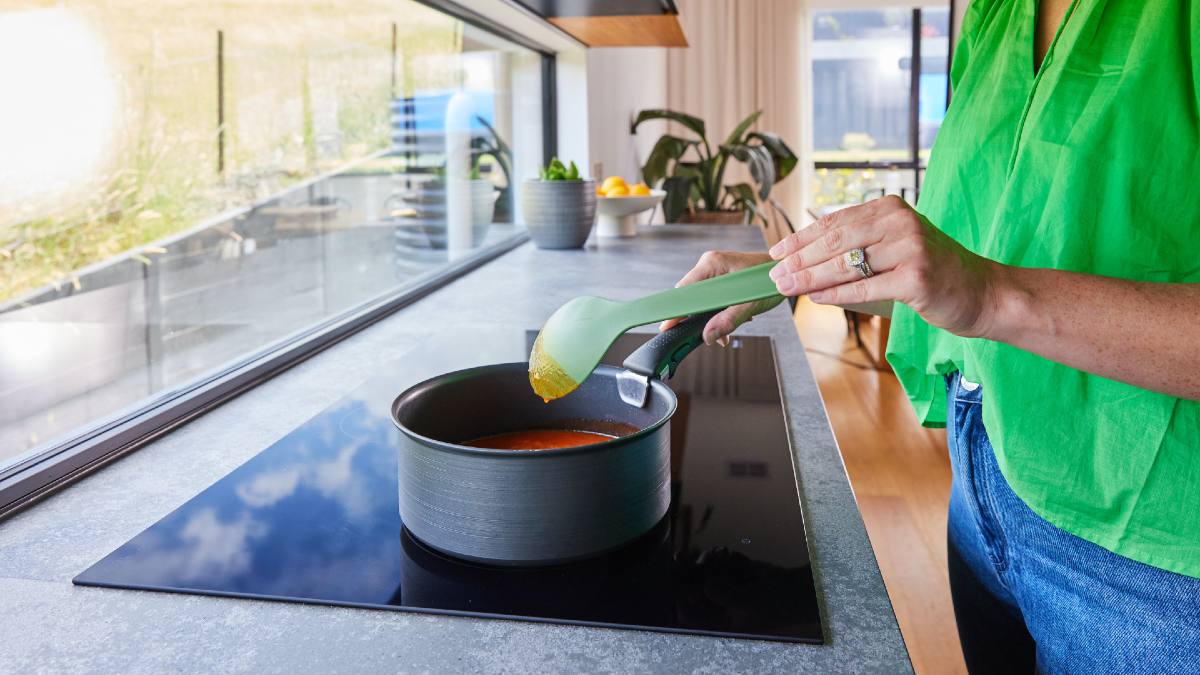Learn how Victorian households can reduce their bills and save money by installing smart home devices like lightbulbs, sprinklers and thermostats.
How to switch your home from gas to electricity: costs, benefits and rebates

Thinking about upgrades to your home to lower your energy bills? Learn how you can convert your household from gas to electricity and take advantage of government rebates.
Energy efficiency is top of mind for Victorian households, with many considering switching from gas cooktops, gas heating and gas hot water to electric systems to reduce their energy consumption and bills.
Government rebates and financial incentives for electric appliances are available as part of the Victorian Energy Upgrades program to encourage households to make the switch to an all-electric home. Victorian households can also benefit from solar rebates, not to mention the savings you can make from adopting solar energy at home or switching your energy provider.
There are rules and regulations that impact those considering building a brand new home. New residential dwellings built in Victoria after 1 January 2024 can no longer be built with gas connections. This covers all residential planning permits approved from the beginning of 2024. All new public buildings, such as hospitals and schools, that have not already reached the design stage must also be all-electric.
The benefits of switching from gas to electricity
Electric alternatives to gas appliances
The benefits of switching from gas to electricity
Why switch from gas to electricity?
Victorians currently use more gas than any other state or territory in Australia. According to Sustainability Victoria, almost 90 per cent of Victorian homes are currently connected to gas, predominantly for cooking and heating. Victorian households are therefore impacted by the rising price of gas.
The Victorian Government estimates that Victorian households can save around $880 off their annual energy bills by going all-electric – or save around $1,820 if they have solar installed.
As part of new rules and regulations regarding new housing builds, the State Government will spend $10 million on a new, forthcoming residential electrification grant program for developers and volume builders to provide solar panel, solar hot water and heat pump rebates to new home buyers.

New homes built in Victoria are no longer able to connect to the gas network and financial incentives exist to encourage the take up of electric products.
Is electricity cheaper than gas?
Electricity is now generally cheaper than gas to power Victorian homes, according to Sustainability Victoria.
While gas was historically a cheaper form of energy, gas prices have risen compared to ‘socket’ electricity costs – that is, what it costs to buy electric power from your energy retailer. By switching from gas to electricity, you can immediately eliminate your gas connection fee and lower your energy bills.
Electric appliances can be significantly more energy efficient than their gas counterparts. A gas heater, for example, can be expensive to operate due to significant gas consumption and electricity for the fans, while a reverse-cycle air conditioner is the most energy-efficient heater and cooler of all types, according to the Department of Climate Change, Energy, the Environment and Water.
Installing household solar panels can make your electricity bills even cheaper, as most of your energy needs can be powered when the sun is shining or stored if you have a solar battery. Renewable energy produced by household solar panels combined with modern, energy efficient electrical appliances is a cost-effective way to reduce energy consumption in the home. You can help further reduce your energy bills by considering a different energy provider.
Are there rebates for switching from gas to electricity?
Yes, the Victorian Energy Upgrades program and Solar Homes Program are government initiatives designed to help financially support households to transition from gas to electricity.
Rebates are available for products such as:
- Heating and cooling systems
- Hot water systems
- Induction cooktops
- Clothes dryers
- Solar panels

Solar power can make your energy bills cheaper, with rebates for solar products available through Solar Victoria.
Is electricity safer than gas?
Electricity is considered safer and healthier for your family than gas. Using gas to cook your food, warm your water and heat your home requires open flames and fumes in your home. This could be problematic because:
- Some gas appliances can release dangerous gases like carbon monoxide and nitrogen dioxide.
- Using natural gas indoors releases gases and particulates linked to respiratory problems. Gas cooking can have the same impact as passive smoking on children with asthma, according to recent research by the Climate Council.
- Open flames on your gas stove can be dangerous, especially for children and pets.
- Gas combustion contributes to higher moisture content in your home, leading to dampness and mould.

Converting your gas cooktop to an electric or induction model can help reduce your energy bills and even benefit your health.
How much does it cost to swap from gas to electricity?
The total cost for switching from gas to electricity can vary depending on the individual home. The costs can be affected by how many existing gas or electrical appliances in your home, whether or not you have solar panels, and the individual pricing of the required qualified tradespeople. You can reduce the upfront cost of going all-electric by replacing one appliance at a time, or by replacing appliances when they reach their end of life.
When calculating the costs, factor in the the labour fees and disposal of the old gas appliance, as well as the new electric appliance. Rebates are available for Victorian households to help make the switch easier too.
Always use a qualified tradie for gas and electricity services in your home. Never attempt to do gas or electrical work yourself to save money.
Step-by-step guide to switching from gas to an all-electric home
- Identify what gas appliances exist in your home. Priotise which need to be replaced first based on usage and cost.
- Research what electric alternatives you want. You may also want to consider installing solar panels if you don't have them already.
- Explore what government rebates you can access and how to access them (i.e. are they applied at the point-of-sale, do you need to apply etc)
- Contact a qualified tradesperson. Together you can finalise the best electric appliances for your home and then they can safely install them for you.
- Get a qualified tradesperson to disconnect your gas only once you no longer have any gas appliances. This is to avoid being without a working boiler, heater or cooktop.

Heat pump hot water systems are highly efficient and can help reduce your energy bill - especially if you also have rooftop solar panels.
Electric alternatives to gas appliances
Reverse-cycle air conditioners
Heating and cooling accounts for around 40 per cent of the average Australian household’s energy use, so it makes sense to prioritise making this switch. Consider switching from centralised ducted gas heating to an efficient reverse-cycle air conditioning system.
They’re cheaper to run, more energy efficient, and can be powered by solar energy. Plus, they can cool your house in summer as well as warm it in winter. Multi-head reverse-cycle as well as ducted reverse-cycle options are available.
Multi-head reverse-cycle
A multi-head reverse-cycle air conditioning system comprises of one outdoor unit that powers multiple indoor units. The indoor units can usually be installed either on the wall or floor. A benefit of multi-head systems is that they allow you to heat or cool room individually.
Ducted reverse-cycle
Ducted reverse-cycle air conditioning uses a unit hidden in a roof cavity or similar space to warm or cool the entire home through a series of vents. They are great for keeping your entire home at the same temperature, with many newer units also able to heat or cool separate 'zones' of your house. Visually they are more discreet, with only the vents visible in each room.
The Victorian Energy Upgrades program provides rebates for replacing inefficient heating and cooling systems with an efficient electric reverse-cycle system.
Heat-pump hot water systems
When your gas hot water system eventually reaches the end of its life, replace it with an efficient heat-pump hot water system. They are considered the lowest operating cost option for hot water heating technology. They can use up to 80 per cent less electricity than a conventional electric hot water system, depending on your individual household requirements and location, and can be powered by your household solar system. The Victorian Energy Upgrades program has rebates for replacing inefficient hot water systems. Rebates through Solar Victoria are already available for hot water systems.
Induction cooktops
Induction cooktops are much more efficient than gas cooktops and operate with better heat distribution and temperature accuracy. If you can’t replace a full stove, you may find a single induction burner is a handy and healthier alternative – it's why RACV chefs now cook with induction cooktops.
After your cooktop, swap out your gas oven for an electric oven. Electric ovens are often cheaper to purchase, and while gas ovens are currently slightly more affordable to run, this will change as gas prices increase and electricity prices decrease. Air fryers can also be an economical alternative to switching on gas cooktop for some renters and single dwellers.

Your gas retailer can send someone out to conduct a final meter reading and disconnect your gas. Image: Getty
How to disconnect your gas
Once the above gas systems are all replaced, you can close your gas account for good so that you never receive gas bills or pay the gas supply charge.
To do this, call your gas retailer and ask them to “conduct a final meter reading, close my account, and close the stopcock or service shut-off valve that supplies gas to my meter”. This last part will ensure that no gas flows through to your meter. The retail company will send someone to visit your property to physically read the meter and close the valve, so a small fee for this service will be included in your final bill.
You don’t need to have your meter or gas supply system removed. If you really want to make sure that no gas leaks occur, you can have a gasfitter cut and cap the pipe from the meter to your house.
How do renters switch from gas to electricity?
Renters can talk with their rental providers about switching from gas to electricity. This improvement may increase the longevity and liveability of their rental property, making it more desirable to future tenants. Some renters may be eligible to receive a discount on a heating and cooling system through the Victorian Energy Upgrades program.
Renters may need to request approval from their rental providers prior to making any switches from gas to electricity. However, rental providers cannot refuse requests which constitute a "reasonable change" without good reason. Changes that "are needed to reduce energy and water bills" are considered a reasonable chage as per Consumer Affairs Victoria.
If your rental provider isn’t on board, you can instead think about energy efficient hacks for renters. Since heating and cooling is a household’s biggest energy expense, investigate temporary draught sealing such as closing off rooms not in use, putting draught stoppers under doors, and applying temporary weather seals to windows, skirting boards, cornices and skylights.
Rental providers can also access solar rebates where renters can co-contribute to the cost of panels. Visit Solar Victoria to find out more.


